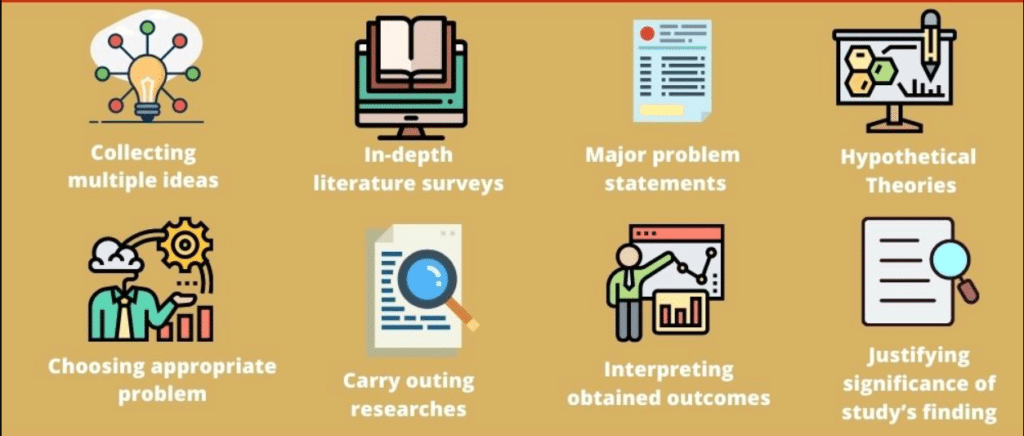
IB General , IB Study Tips
October 26, 2023

How to Write a Research Proposal for Your IB Extended Essay
Introduction.
Preparing for the Extended Essay (EE) process often begins with writing a research proposal. This crucial step provides an essential overview of the path you’ll take and serves as your starting point. Crafting a well-thought-out proposal is essential as it helps you gain clarity about your research journey. In this guide, we will walk you through the process of creating an effective Extended Essay proposal.
An Example Extended Essay Proposal Form
Here’s an example proposal form with detailed explanations and examples for each section:
1. Topic and Subject
Your Research Topic: Provide a concise and clear title that encapsulates your research idea. For instance, “The Impact of Climate Change on Coral Reefs in the Great Barrier Reef.”
Relevance to Subject: Explain how your chosen topic is related to the specific subject you’re studying within the IB program. In this case, “This research is under the Biology subject since it explores the ecological impact of climate change on marine ecosystems.”
Research Scope: Define the scope of your research. Specify whether you’ll focus on a specific aspect, location, or time frame. For example, “I will examine the effects of rising sea temperatures on coral bleaching in the Great Barrier Reef over the past decade.”
2. Motivation and Engagement
Research Objectives: Clarify what you aim to achieve with your research. “The primary objective of this study is to understand the correlation between rising sea temperatures and coral bleaching events in the Great Barrier Reef and its ecological consequences.”
Significance: Explain why your research topic is significant. “This research is essential because it provides insights into the urgent issue of climate change and its effects on vital marine ecosystems. Understanding these dynamics is crucial for preserving biodiversity and environmental sustainability.”
Existing Knowledge: Discuss what is already known about the topic. “Previous studies have identified the link between climate change and coral bleaching. However, this research aims to provide a comprehensive analysis of this phenomenon, taking into account specific factors unique to the Great Barrier Reef.”
Research Questions: List specific research questions that your study will address. “1. What is the trend of sea temperature increase in the Great Barrier Reef over the past decade? 2. How does rising sea temperature correlate with the frequency and severity of coral bleaching events? 3. What are the ecological consequences of coral bleaching in this region?”
3. Methodology and Materials
Research Approach: Explain the methodology you’ll use to answer your research questions. “This study will employ a combination of field surveys, data analysis, and laboratory experiments to collect and analyse data on sea temperature trends and coral health.”
Data Collection: Describe the data sources and collection methods. “Sea temperature data will be collected using data loggers placed at various locations within the Great Barrier Reef. Coral health data will be collected through underwater surveys and laboratory experiments.”
Data Analysis: Detail the techniques you will use to analyse the data. “Statistical analysis, such as regression and correlation, will be employed to assess the relationship between sea temperature and coral bleaching. Ecological consequences will be assessed through qualitative analysis of ecosystem changes.”
Materials Needed: List the specific materials or equipment required for your research. “Required materials include data loggers, diving equipment, underwater survey tools, and laboratory facilities for sample analysis.”
4. Timeline and Resources
Research Timeline: Provide a timeline that outlines key milestones and deadlines for your research. “Month 1-2: Literature review and proposal preparation. Month 3-4: Data collection and analysis. Month 5-6: Report writing and finalising the Extended Essay.”
Resource Allocation: Estimate the resources you’ll need for each phase of your research. “Month 1-2: Library access for literature review. Month 3-4: Dive equipment rental and data loggers. Month 5-6: Software for data analysis and word processing software for report writing.”
This extended essay proposal form provides a structured template for you to craft your research proposal effectively. It ensures you consider all essential elements, from the research objectives to the required resources and timeline. Tailor this form to your specific research topic and subject to create a well-rounded and comprehensive proposal.
Start by setting aside time in your busy schedule to explore topics that genuinely interest you. Seek inspiration from various sources such as newspapers, articles, YouTube videos, conversations with people around you, or even TikTok videos. The goal is to spark that “Eureka” moment that leads to a unique and engaging research idea.
The Research Question
When developing your research question, keep it open-ended, without a predetermined answer. This approach allows for a broader exploration of different possibilities, letting your research and investigation lead to the answer naturally.
Resources Needed
Once you’ve settled on your research idea, you must identify the resources required for your investigation. Resources can range from physical materials and spaces to software tools that aid your research process.
The Timeline
Effective planning is essential for managing your EE project successfully. Create a detailed timeline that outlines the various tasks and milestones necessary for completing your Extended Essay. Consider factors like upcoming exams or deadlines that might impact your available time. It’s crucial to review your timeline with your teacher to ensure its viability and that you have enough time for each stage of the project.
Key stages to include in your timeline:
– Initial Background Research
– Conducting Main Research
– Data Analysis
– Essay Structure Planning
– First Draft
– Draft Revision
– Final Draft Submission
Writing a compelling Extended Essay proposal is the first step towards a successful research project. By carefully considering your idea, research question, timeline, and required resources, you’ll be well-prepared to embark on your EE journey. Remember that your teacher is there to guide you through this process, so don’t hesitate to seek their support and feedback along the way.
Best of luck with your Extended Essay! With the right preparation and dedication, you can achieve outstanding results.
Related Posts

All You Need to Know About IB Internal Assessments

Your Comprehensive Guide to Navigating the IB Extended Essay

Ultimate Guide to the IB Final Exam Prep: Resources, Strategies, and Crash Course

An Introduction to the IBDP for Parents and Students
Contact Info
545 Orchard Road #14-06/09 S(238882)
(+65) 61009338
QE_Singapore
Mondays to Fridays: 10am to 7pm
Quick Links
Join Our Mailing List
© 2024 Quintessential Education™
How to Write an Extended Essay Proposal

The first ‘official’ step in the Extended Essay process is often writing a proposal. This can seem intimidating at first, but it’s a really helpful thing to write. It’s a great way to get an overview of the steps along the EE journey and it helps you get started – which can be one of the hardest parts!
In your proposal you lay out your idea, your timeline for working on it, and what you will need to conduct the research. Here we’ll take you through how to write an Extended Essay proposal by looking at each of these parts.
Coming up with an idea is often the hardest part! The key to this is setting aside specific chunks of time to deep dive into topics you find interesting. It’s highly unlikely that an idea will randomly pop into your head otherwise.
In these scheduled chunks, spend time looking at newspaper and journal articles, TED talks, documentaries etc. The recommended section with related articles is a great place to find the next thing that you want to look at. It’s like the YouTube recommended videos, except falling into a hole on these is actually helpful for your research!
For more tips on finding your topic, check out our previous blog post about it here .
The Question
Most schools will ask you to give your research question in your proposal. Don’t worry – this can normally be altered later on as long as it’s not a complete topic change!
The key thing to remember when developing your research question is that it needs to be open-ended enough to allow you to fully investigate your topic. You shouldn’t go into your research with an answer to your question already in mind, and so your question shouldn’t direct you to any one outcome.
For more specific help with writing your question, take a look at this blog post .
The Timeline
A key use of the proposal is to help your teachers determine if your Extended Essay topic is viable. One of the main ways that they assess this is through the timeline that you suggest. The IB say that your EE should take 40 hours to complete. While this may seem like a lot at the moment, once you get started you’ll realise it’s actually not much time! It’s important that any project you embark on isn’t going to take longer than this. We all know how busy the IB is!
An easy way to create a timeline is to use the different stages of writing the essay. For example, you will need to do research, analyse your date, plan the essay, write the first draft, edit it, and then produce a final draft. Some of these stages (like conducting your research and analysing data) are likely to take longer than others.
It’s also important to consider the other deadlines you have during the time when you’re working on your EE. For example, if you have exams at the end of the school year it’s unlikely that you’ll be able to do all of your EE research at the same time as revising for them.
Here’s an example of a timeline:
- Initial background research – early April
- Conduct main research – late April to end of May
- Data analysis – July
- Plan structure of essay – August
- Write first draft – first 2 weeks of September
- Revise draft – last 2 weeks of September
- Final draft hand in – first week of October
Notice how I’ve not planned anything for June – this gives time to revise for end of year exams and to take a proper break at the start of the summer!

Resources Needed
Schools often use the proposals to get an idea of the support that you will need throughout the EE process. It’s important to make sure you lay out any resources you will need. This might be specific chemicals or space in a lab if you’re doing a Chemistry project. For a Geography project, this might be a specific piece of mapping software like ArcGIS.
Thinking through what you will need is also a helpful starting point for you. It will hopefully help you get started with your research as quickly and smoothly as possible!
Throughout writing your proposal, it’s important to remember that the aim isn’t to answer your research question! This document is about planning your project and is really designed to help you make sure it’s feasible.
If you’re having trouble with your Extended Essay proposal, we are here to help! Check out the “IB Extended Essay” category on the blog or take a look at the online private tuition that we offer here .
Share article links
Related Articles

- IB - Understanding It
- Most Popular
- Study Skills
Coping with the Impacts of COVID-19
The past year and a half has been challenging for everyone, but here at Lanterna we see the impact on students daily. Our tutors see first-hand how students around the world are struggling with coping with the impacts of COVID-19. To get a better understanding of exactly what you’re finding tough and how we can […]

- Plan for Success
- Revision Skills
Top 4 Tips for Getting Started Studying Again
If you’re struggling with getting started studying again at the beginning of a new school year, you’re not alone! Getting back into the routine of studying can be challenging after weeks of free time. Here we’ll take you through our top three tips for getting started studying again. If you’re struggling with motivation, check out […]

Top 5 Essentials for Studying Geography
Geography is one of the broadest topics offered within the IB Diploma Programme. The course asks you to understand a wide range of physical and human processes, while using skills normally encountered in both the sciences and humanities. If you’re struggling to master this combination of knowledge and skills, don’t worry! Here we will take […]

- Customer Reviews
- Extended Essays
- IB Internal Assessment
- Theory of Knowledge
- Literature Review
- Dissertations
- Essay Writing
- Research Writing
- Assignment Help
- Capstone Projects
- College Application
- Online Class
Extended Essay Proposal: The Complete Guide for IB Students
0 Comments
by Antony W
May 19, 2023

Do you feel like your Extended Essay idea is good enough but you’re not sure if your supervisor will like it? You can pitch it to them in a written proposal.
The question is:
How do you write a comprehensive Extended Essay proposal without staggering in the process?
Well, that’s what this guide aims to teach you. So let’s get to it.
Key Takeaway
It’s easy to write a proposal for your EE project. The steps are as simple as explained below:
- Choose a topic that you find interesting to explore.
- Conduct preliminary research to learn more about your topic.
- Develop a research question.
- Write, proofread, and submit your proposal.
Don’t have the time to write an Extended Essay because you’re busy with IA and ToK? Hire a top IB Extended Essay writer from Help for Assessment to do the writing for you. We do everything from topic selection and research to writing and everything in between. That means our pro writing can help you get the job done fast and on time.
How to Write an Extended Essay Proposal
Follow these steps to write a comprehensive Extended Essay proposal:
1. Choose a Relevant Topic
To begin flexing your intellectual muscles, it’s essential to choose a topic that’s worthy of your brainpower.
You must align your topic with one of the six subject groups provided by the IB program. And remember that the subject group will ultimately determine the outcome of your EE.
Once you’ve chosen a subject group, it’s time to unleash your creativity and let your ideas flow. Don’t be afraid to jot down every possibility, even if it seems unconventional or wild.
As you brainstorm potential Extended Essay topics , keep your eyes on the shining gems hidden in the rubble. These are the ideas that have true potential to bring out your creativity and reflective your critical thinking, analytical prowess, and writing skills.
However, balancing personal interests with academic rigor is essential. While you may be passionate about a particular topic, it’s important to ensure it has the academic substance required to impress IB.
2. Conduct Preliminary Research
Before you dive into your research, it’s important to remember that preparing and planning is crucial. Think of it as laying the groundwork before unleashing your creativity. After all, a well-crafted research plan sets the stage for your extended essay to shine.
While the internet is an abundant source of information, it’s important to use it with caution. Equip yourself with the right tools and resources to sift through valuable information.
Look for information from reputable databases, scholarly journals, and books that are relevant to your topic. A well-researched essay increases your chances of getting the IB’s stamp of approval.
It’s easy to fall prey to sleek websites or impressive-sounding titles, but not all sources are reliable. Be a critical thinker and learn to separate trustworthy sources from the unreliable ones.
Check authors’ credentials, scrutinize publishers, and ensure your sources aren’t just presenting baseless claims or biased opinions. Trustworthy sources are key to a successful Extended Essay.
Be selective as you sift through the vast amount of data available. Remember that not every piece of information will be relevant to your essay. Be rigorous in your pursuit of relevancy and keep only the evidence that contributes to your research question.
3. Develop Your Research Question
Now it’s time to distill all that knowledge into a single, powerful research question . This question will serve as your guiding star as you navigate the challenges of the extended essay.
Your research question should be clear, strong, and focused. It should be specific enough to be manageable but broad enough to allow for in-depth exploration.
A great research question should captivate your reader’s attention and leave them wanting more. Resist the temptation to solve all the world’s problems in 4,000 words. Instead, focus on a specific aspect of your topic that you can explore thoroughly.
Make sure that your research question is firmly rooted in your chosen subject group. You don’t want to venture into the uncharted territory of another subject, leaving your teachers confused. Keep your research question and subject group in harmony instead.
4. Write Your Extended Essay Proposal
The fourth step is to write your Extended Essay proposal, review the document, and submit it to your supervisor.
Your proposal should have the following elements:
- Introduction: Begin with a brief yet engaging introduction that will spark your supervisor’s interest and leaves them eager for more.
- Research Question: Reveal your research question. This section should be short and to-the-point.
- Preliminary Research: Show your supervisor that you have the scholarly aptitude to work on the selected topic by presenting a thoughtfully selected collection of relevant data and information.
- Methodology : Describe your plan to address the research question, with methods that are as precise and helpful.
- Essay Structure Outline: Provide a roadmap of your essay’s structure to guide your reader through the journey of your intellectual exploration.
To make your proposal shine, write with purpose and precision. Use clear, concise, and captivating language to persuade your reader that your research question is both fascinating and worthwhile.
Remember, your goal is to make your proposal stand out. So avoid overly verbose or ornate writing, and instead keep your prose straightforward and to-the-point.
Final Thoughts
As you can see, it isn’t difficult to write an Extended Essay proposal. You choose an interesting topic, conduct some preliminary research, develop your research question, write the proposal, and then send the document for review.
It’s as simple as that.
Remember that writing a strong proposal is not only essential for succeeding in your extended essay, but it also helps you cultivate important skills in research, critical thinking, and persuasive writing.
In fact, these are essential because they will help you throughout college or university, not to mention that they will be helpful afterwards.
Through this process, you will become a more skilled and self-assured scholar, well equipped to tackle future academic endeavors with confidence.
About the author
Antony W is a professional writer and coach at Help for Assessment. He spends countless hours every day researching and writing great content filled with expert advice on how to write engaging essays, research papers, and assignments.

IMAGES
VIDEO